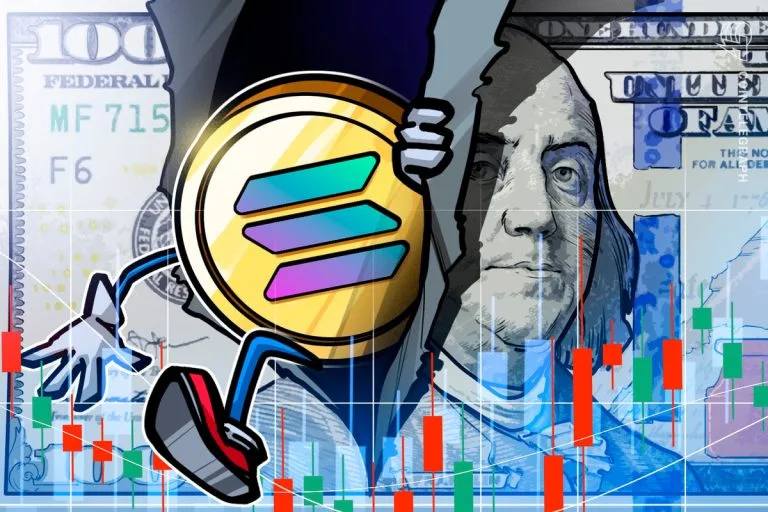Key Takeaways
-
Solana’s SOL token has recovered above $200, but a combination of subdued onchain activity and increasing competition may hinder a sustained price surge.
-
Despite a lack of strong bearish sentiment among traders, stagnant network growth and a shifting market landscape appear to be limiting SOL’s upward potential.
Solana’s native cryptocurrency, SOL, has managed to reclaim the $200 mark following a significant price dip to $167 on Friday. This sharp decline resulted in approximately $1.73 billion in long liquidations, raising questions among traders about whether the prior bullish momentum has dissipated and if a $300 price target remains achievable within the current market cycle.
Current indicators suggest a muted demand for leveraged long positions, evidenced by the perpetual futures funding rate hovering near 0%. Typically, under normal market conditions, this rate fluctuates between 6% and 12%, reflecting buyers’ willingness to pay for sustained exposure. It is noteworthy that Solana’s funding rate was already around 4% before Friday’s price drop, which was below the typical neutral range.
💡 A negative funding rate traditionally suggests short-seller dominance, although this situation is often transient due to the costs associated with maintaining short positions. The current strain observed in Solana’s derivatives market likely reflects the broader repercussions of Friday’s extensive liquidations across the cryptocurrency sector.
Assessing Solana’s Network Activity and Competitive Landscape
Onchain metrics for Solana indicate a consistent lack of bullish impulse, even as SOL trades significantly below its previous all-time high of $295 set in January. Network activity has yet to fully recover since the peak of the memecoin surge earlier in 2025. Furthermore, Solana has seen its leading position in decentralized exchanges (DEXs) challenged by emerging competitors who are steadily capturing market share.
Decentralized applications (DApps) operating on the Solana blockchain recorded approximately $35.9 million in weekly revenue, with total network fees amounting to $6.5 million. This represents a 35% decrease compared to the previous month, signaling a slowdown that potentially reduces the demand for SOL as a transactional token for network operations.
📍 This reduced activity not only impacts the utility of SOL but also tends to lower staking yields for holders, potentially contributing to further price pressure.
In contrast, rival blockchain networks such as BNB Chain, Ethereum, and Hyperliquid have experienced notable increases in their transaction fees, largely at Solana’s expense. BNB Chain, in particular, generated an impressive $59.1 million in weekly fees, largely attributed to the success of four.meme, a memecoin launchpad platform that is fully integrated with Binance Wallet and is positioned as a direct competitor to Solana’s Pump.fun.
✅ Even if the current momentum on BNB Chain proves to be temporary, the overall fee volume across the Ethereum ecosystem has seen a substantial rise. Layer-2 scaling solutions like Base, Arbitrum, and Polygon have each reported weekly fee increases of 40% or more. Uniswap, a prominent decentralized exchange, achieved its highest-ever weekly fees, reaching $83.8 million, driven significantly by activity on the Ethereum mainnet and Base. Concurrently, Hyperliquid also benefited from the market volatility experienced on Friday, posting a significant uptick in trading fees.
📊 To assess whether SOL traders are adopting a more bearish stance, it is instructive to examine the balance between call (buy) and put (sell) options.
For the past week, the SOL put-to-call volume ratio on Deribit has consistently remained below 90%, indicating subdued demand for bearish or neutral options positions. Historically, this metric has climbed above 180% when traders anticipate a market correction—a level last observed on September 20, following an 11-day period where SOL’s price increased by 26.7%.
⚡ While the volatility-induced distortions from Friday’s flash crash may have affected SOL’s derivatives metrics, the sustained weakness in onchain activity, coupled with the growing momentum of competing blockchains, presents a significant concern. The advancements made by platforms like Aster, Hyperliquid, and Uniswap appear to be directly impacting Solana’s potential for further price appreciation.
📌 It is unlikely that a single positive development, such as the potential approval of spot Solana Exchange-Traded Funds (ETFs) in the United States, would be sufficient on its own to propel SOL’s price to the $300 mark in the immediate future, even if traders were not overtly bearish.
Fundfa Insight
Solana’s recovery above $200 is a positive sign, but persistent low network activity and increasing competition from other blockchains like BNB Chain and Ethereum Layer-2 solutions pose significant challenges to sustained bullish momentum. Traders remain cautious, as indicated by muted derivatives market activity, suggesting that achieving a new all-time high for SOL may require more than just favorable regulatory news.

